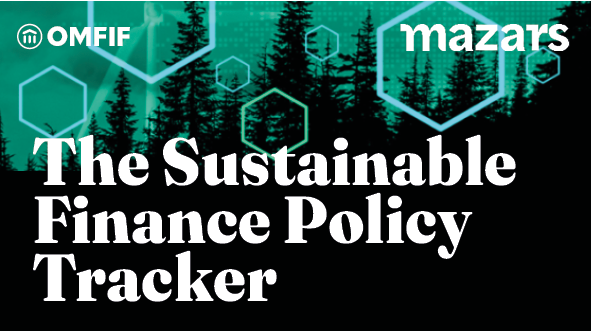
It’s time to stop bankrolling deforestation
It’s time to stop bankrolling deforestation
In fighting the 2008 financial crisis, major central banks funded widespread destruction of critical forest environments, writes Veronica Oakeshott, Forest Team Leader at Global Witness.
Sustainable Finance Policy Tracker
The Sustainable Finance Policy Tracker provides a comprehensive overview of different countries’ approaches to mitigating climate risks in the financial sector.
Understanding the impact of biodiversity loss
There is a growing focus on nature-related risks by financial market participants and regulators, explains William Attwell, associate director – climate risk, Sustainable Fitch.
Nature loss is threatening debt sustainability
Biodiversity must be incorporated into debt sustainability assessments, write Moritz Kraemer, senior fellow, and Ulrich Volz, professor of economics and director of the Centre for Sustainable Finance, SOAS, University of London.
Translating biodiversity and nature risks into financial risks
Major improvements need to be made for the financial sector to accurately identify biodiversity and wider nature-related risks, explains Hugh Miller, analyst, green finance and investment team, Organisation for Economic Co-operation and Development.
Integrating nature into decision-making
Financial institutions need standardised risk management and disclosures to respond robustly to the risks arising from nature loss, writes Emily McKenzie, technical director, Taskforce on Nature-related Financial Disclosures.
Protect the ocean, protect the economy
Dennis Fritsch, associate programme lead nature, United Nations Environment Programme Finance Initiative, explains how a new framework can support the finance industry in transitioning to a sustainable blue economy.
Nature-related stress tests are possible today
Financial institutions already have the tools they need to quantify nature-related opportunities and risks, write Robin Smale, partner, and Charlie Dixon, solution manager, McKinsey & Company.
Financing a nature-positive future
Our health, wealth and security depend on natural capital under threat from biodiversity loss and climate change, writes Maud Abdelli, lead, greening financial regulation, WWF.
Nature finance is the next wave
Accurately measuring and reporting nature-related financial risks forms a strong foundation for safeguarding biodiversity, writes Simon Zadek, executive director, NatureFinance (formerly the Finance for Biodiversity Initiative).
Climate finance and the IMF
Ahead of COP27, the International Monetary Fund is releasing a paper on climate finance, carbon taxes and their impact on accountancy firms. Bo Li, deputy managing director of the IMF, discusses the paper and the IMF’s role in advancing sustainable finance and the COP agendas.
Macroeconomic consequences of environmental degradation
The Central Bank of Chile has been increasingly focused on the interaction between the environment and the economy. Elias Albagli, director of the central bank´s monetary policy division, joins OMFIF to analyse the macroeconomic consequences of environmental degradation and discuss the medium-term research agenda of the Environmental Economics Group within the bank.
In conversation with De Nederlandsche Bank
Saskia de Vries, Head of the International Financial Architecture department at the Financial Stability division of De Nederlandsche Bank, speaks with Emma McGarthy, head of OMFIF’s Sustainable Policy Institute, about the role of central banks in driving nature-related risk mitigation, accelerating nature-positive financial flows, and the Network for Greening the Financial Sector’s task force on biodiversity loss and nature-related risks.
















